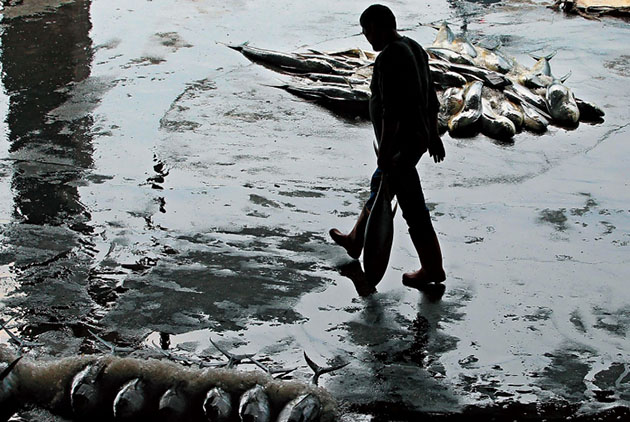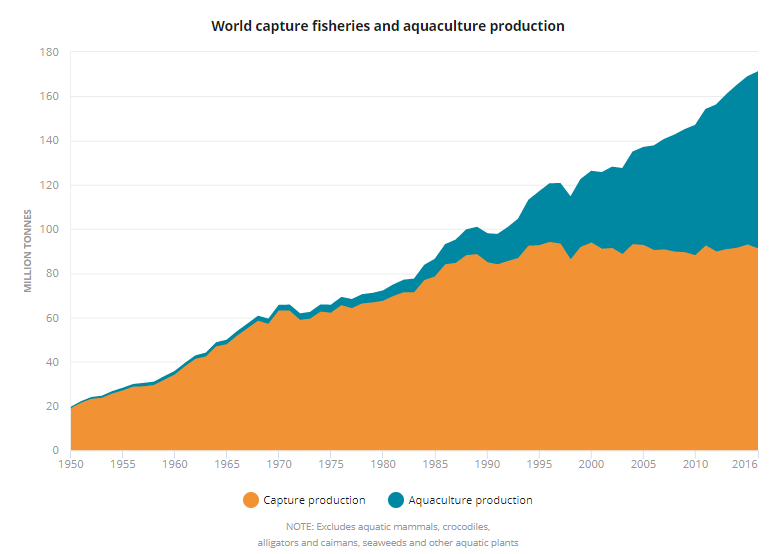World Economic Forum
One in Three Fish Caught is Thrown Away, According to a New UN Report

Source:Chieh-Ying Chiu
According to the latest report published by the U.N. Food and Agriculture Organization, while fish consumption is at an all-time high, the state of fisheries is becoming increasingly unsustainable.
Views
One in Three Fish Caught is Thrown Away, According to a New UN Report
By Thin Lei Winweb only
A third of the world's oceans are overfished and fish consumption is at an all-time high, raising fears over the sustainability of a key source of protein for millions around the world, the United Nations warned in a report on Monday.
Overfishing is particularly bad in parts of the developing world where many people already struggle to get enough nutritious food to eat, the U.N. Food and Agriculture Organization (FAO) report said.
"There's too much pressure on marine resources and we need significantly more commitments from governments to improve the state of their fisheries," said Manuel Barange, director of the FAO fisheries and aquaculture department.
"We predict that Africa will have to import fish in the future," he told the Thomson Reuters Foundation, adding that shortages could lead to higher prices, disproportionately affecting the poor.
Barange said Africa had great potential for aquaculture, but needed support in terms of finance, feed and supply of fish.
Fish farming or aquaculture - the fastest growing agricultural sector for the past 40 years - has been largely responsible for making more fish available, said the report.
As catches from the open sea continue to dwindle, more countries are turning to fish farms. In Algeria, the government is encouraging farmers in the Sahara desert to grow fish to increase their income and boost fish production.
Critics say it can damage the environment and put disease and invasive species into the wild, but Barange said the solution was to have "proper regulation, legislation and monitoring and control".
Traditional fishing nations are also promoting the potential of fisheries to improve nutrition and end hunger.
Globally, the percentage of stocks fished at unsustainable levels increased to 33.1 in 2015, from 31.4 in 2013 and 10 in 1974.
Fish consumption reached an all-time high of 20.2 kg (44.5 lb) per person from 9 kg in 1961, said the report, and further rises are expected as health-conscious consumers turn to fish.
Currently, 3.2 billion people rely on fish for almost 20 percent of their animal protein intake.
Shakuntala Thilsted, research programme leader at international nonprofit WorldFish, said reducing losses and waste would go a long way towards making fisheries sustainable, with an estimated 35 percent of catches thrown away.
"Fish heads, fish bones are (the) parts that are most nutritious. Why aren't we using innovative solutions to turn this into nutritious, palatable food?" she said.
Edited by Shawn Chou
Additional Reading
♦ Where Does Our Fish Come From?
♦ A China-made Environmental Catastrophe
♦ Taiwan's Barren Waters: The Fish Are Gone
Original content can be found at the website of World Economic Forum.
♦ One in three fish caught is thrown away, according to a new UN report
This article is reproduced under the permission of World Economic Forum (WEF) and terms of Creative Commons Attribution-NonCommercial-NoDerivs 4.0 Unported License (“CCPL”). It presents the opinion or perspective of the original author / organization, which does not represent the standpoint of CommonWealth magazine.








